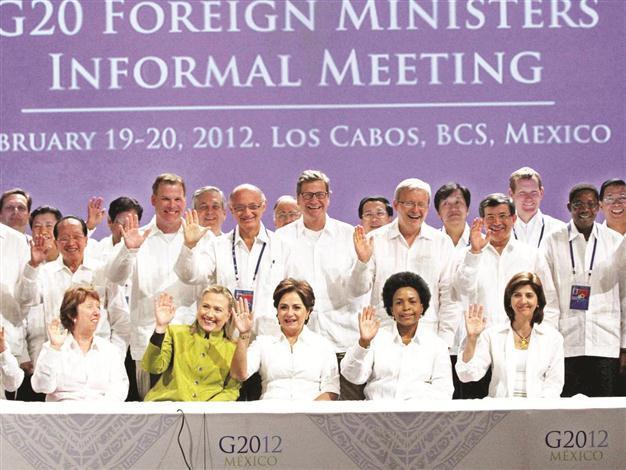G-20 turns to politics despite financial woes
ISTANBUL / LOS CABOS, Mexico

Turkish Foreign Minister Davutoğlu (2nd
line R) poses with his counterparts at a
G-20 summit in Los Cabos, Mexico. AA photo
A club of the world’s top 20 economies have shifted their attention to political issues despite the ongoing global crisis amid an unprecedented rise in diplomatic and regional tensions and major divisions at the U.N. Security Council.
Meeting at Los Cabos, Mexico, foreign ministers of the Group of 20 discussed the Syrian government’s ongoing crackdown on the opposition and fears of civil war, plus the rising tension regarding Iran’s nuclear program.
Foreign Minister Ahmet Davutoğlu represented Turkey at the informal meeting, engaging in active diplomacy on Syria and Iran with his counterparts.
The meeting was a first for the G-20, which held its first meeting in 2008 at a time when the global recession was wreaking havoc on economies worldwide. The group, which comprises the world’s biggest 20 economies, was originally a venue for finance ministers and central bankers of 19 countries, plus the European Union.
A first, cautious stepWith the Feb. 19 and 20 Los Cabos gathering allowing the organization to chart new waters for the first time, Davutoğlu held talks with German Foreign Minister Guido Westerwelle, Argentine Foreign Minister Hector Marcos Timerman and the EU’s top security policy official, Catherine Ashton, to discuss Iran, Syria, Turkey’s relations with the EU and the Cyprus problem.
The summit, hosted by Mexican Foreign Minister Patricia Espinosa Cantellano, comes a few weeks after Russia and Syria on Feb. 4 vetoed a U.N. Security Council resolution on Syria. The Arab League has also been ineffective as its observers left Syria in late January, citing escalating violence that made it impossible to continue their mission.
Addressing his counterparts on the last day of the summit, Davutoğlu called on member countries and organizations to become involved in a more efficient and comprehensive way as they deal with the problems in their regions. Furthermore, he said the international system should be designed in a way to allow for a better response to global problems which have political, economic and cultural dimensions.
“In the economic area, reforms should be made in management and vote-casting structure of economic institutions and the G-20 should revise its functioning and structure within that scope,” said Davutoğlu. “In the cultural area, the international community should internalize global values with local values.”
Following bilateral meetings, Davutoğlu said Turkey had been urging the Syrian government to “end its fight against its own people” at every opportunity for the past year.
“The failure of the U.N. Security Council to pass a resolution on Syria should not misdirect the Syrian administration,” Anatolia news agency quoted him as saying.
“The Syrian administration has been conducting a fight against its own people. It must be stopped as soon as possible. We are determined to give a clear message on more concrete steps … in the meeting that will be held in Tunisia,” he said in reference to a landmark conference on Syria that will be held in Tunisia on Feb. 24.
Davutoğlu said he hoped the Security Council members would make a “positive response” this time to the call that would be made in Tunisia. Turkey will continue taking the necessary steps in assisting the Syrian people, he added.
Touching on nuclear talks that are planned to be held between Iran and the so-called P5+1 (United States, Russia, China, Britain, France and Germany), Davutoğlu said the latest developments were positive in reference to Iran’s statements that it was ready for a meeting to be held in Istanbul.
In his meeting with Ashton, Davutoğlu said Turkey would be pleased to host such a meeting.
